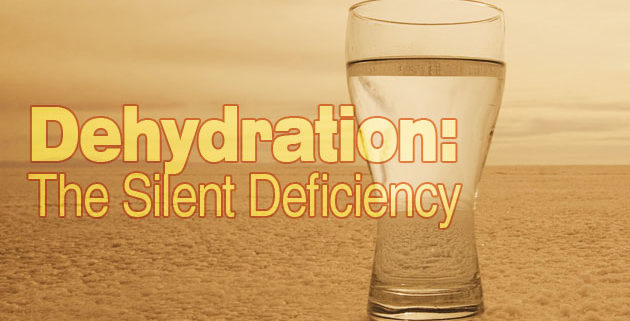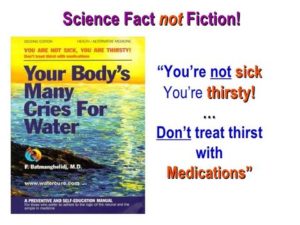Your Body’s Many Cries For Water (Review)
I have a little knowledge bomb to drop on you that may actually get you into the habit of starting to drink more water, and it involves the dreaded “turkey neck” we all want to avoid.
Did you know that “turkey neck” actually results overtime from over-active salivary glands which overcompensate for chronic dehydration? Meaning that, if you simply start drinking adequate amounts of water, you could potentially avoid “turkey neck” altogether and maintain the suppleness of your skin!
(Here’s the part of the article where you feverishly run to go get your water and begin to chug.)
Think being chronically dehydrated is no big deal?
Think about this: How much do you love saggy skin, deep wrinkles, constipation, and allergies?
We are all well meaning with regard to water. We know we need to drink water. We choose to carry bottled water with us, even though we might not always finish it. And many of us are ignorant to how important water is to every cell of our body. Our dehydration isn’t intentional. It’s unintentional at best. A term I have come to appreciate is one called Unintentional Chronic Dehyration (UCD), a condition coined by Dr. F. Batmanghelidj, author of one of my preferred books on the subject of hydration, “Your Body’s Many Cries for Water”.
The book, based on “Dr. B’s” clinical and scientific research into the role of water in the body highlights just how many diseases and conditions could potentially be avoided or eliminated if we would simply stop treating thirst with medications. After all, as you will find out reading the book, most of the issues that top our health charts today are actually a underlying UCD issue, especially gastritis which is what led is research into water.
Water is the single most common nutrient deficiency among our population. Though the person may be unintentional with their water consumption, the body is very intentional in initiating a kind of “drought management system” to preserve water. The symptoms characterized by UCD are then classified as diseases such as:
- Asthma
- Allergies
- High blood pressure
- Chronic Fatigue
- Migraines
- Sjogren’s Syndrome
- And even diabetes… a quote from the book cites, “Insulin Inhibition is an adaptation process of the gland {pancreas} to the dehydration of the body.”
- What I appreciated about the book was how it immensely influenced the way I personally consumed water and increased it ten-fold! It’s been in my arsenal for years now as I refer back to it when I can’t seem to pinpoint the root cause of someone’s nutritional issue. When in doubt, it’s usually that someone’s all dried out.
The book gives us very solid symptom checking with regards to dehydration, but not what you normally have heard from mainstream nutrition such as, did you know…..
…that dry mouth is not the main sign of dehydration, but in fact it’s the most final sign indicative of extreme dehydration.
….waiting until you are thirsty to drink is actually harmful to your hydrated status?
….a proven treatment for heartburn is water alone?
…issues such as gastritis, and inflammation of the duodenum is a thirst signal and the most important signal with regard to dehydration?
…rheumatoid arthritic pains are to be seen as a water deficiency?
…even hypertension should be viewed as a result of chronic dehydration?
What happens when we unintentionally chronically avoid water? It’s all about thirst signals you may not even have noticed.
— one of the first symptoms of chronic dehydration, is lack of thirst. You lose the thirst signal.
— You produce less saliva which is another thirst signal. (Remember the “turkey neck?”)
— debilitating Fatigue when you feel you should have energy. How about that afternoon slump?
— daily headaches or migraines
— muscle cramps and muscle weakness
— constipation…..Mouse pellets are not the poo you want to do.
— Skin that doesn’t bounce back when you pinch it.
Then there is the quote from the book about how we confuse thirst with hunger:
“…The sensation of the thirst and hunger are generated simultaneously…We do not recognize the sensation of thirst and assume “Both indicators” to be the urge to eat. We eat food even when the body should receive water. In these people who lost weight, by drinking water before eating food, they managed to separate the two sensations. They did not overeat to satisfy an urge for the intake of water.”
Water is essential for every single cell of your body no matter what the function is. I love the aspect that Dr. B touches on when we phrases it this way: “Every function of the body is monitored and pegged to the flow of water.” It’s available everywhere and in many forms. without it, you put your body at greater risk not only for weight gain but chronic illness and shortened life span.
(Again, I can hear you sipping away on your water now!)
Dr. B’s work has led him to believe that proper hydration, as well as adequate salt intake, moderate exercise and a good diet can prevent and/or cure just about anything. He also claims that water is a major energy source, hydroelectricity, for the brain and body.
According to Dr. B, the brain cells themselves are said to be 85% water As a chronic dehydration nation, it’s no wonder then that brain fog is also a standard complaint as well.
Go ahead and sip your water once again as we discuss some solutions to begin to heal many of these common mistaken thirst signals and finally get relief from those nagging issues. These solutions and more are recommended by Dr. B within the book.
Step 1. Drink only water. When you know your body is running short on water, it needs only water. Not the water in the coffee you brewed. Not the water in the soda you drank. Just plain water. Then after you have created chronic HYDRATION within, the occasional cup of coffee, and fizzy club soda will tolerated just fine.
Step 2. Have a pinch of sea salt before you drink water. To quote Dr. B’s sub-title in Chapter 12, “Salt Free Diet is Utterly Stupid”. Preach it. We are essentially made of a salt-water solution if you think about it. We pee salt-water. We cry salt-water. Our blood is like red salt-water. We sweat salty water onto our skin. We bathe our unborn baby in a bag of sea water essentially. Which means we need to constantly be replacing the salt loss as well. For every 10 glasses of water, Dr. B recommends one add to the diet about half a teaspoon of unrefined sea salt per day.
Step 3. Invest in a reputable water filter. There are good filters out there today that use carbon, or ceramic or even coconut filters and will save you from buying bottled water from the store, which usually comes in plastic containers and can leach harmful synthetic toxins into the water, such as BPA (Bisophenol A). But even if you can’t invest in a filter, you can still eliminate much of the chlorine in tap water by a wonderful recommendation that the book gives here:
“…fill an open-top jug with water and let it stand in the refrigerator or on the kitchen counter… the chlorine that is dissolved in the water will evaporate and the smell of it will go too. The water will become sweet and very easily palatable.”
I myself do this when I’m staying at hotels and do not have access to good water. I’ll simply fill up my water bottle and leave it on the counter with the lid off overnight and have fresh water for in the morning.
And there are many more examples like this given in this incredible book.
Aside from “turkey neck” and brain fog, the reasons for creating a habit of drinking more water are endless and as we have learned here unavoidable when it comes to disease prevention.
I highly recommend becoming “intentional” with your hydration and learning more by investing in this stellar book. Available here for a very affordable price: Your Body’s Many Cries For Water Book





Leave a Reply
Want to join the discussion?Feel free to contribute!